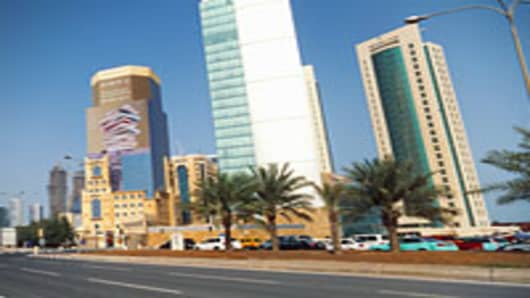On this clear, spring day, the scene at the Waldorf Astoria hotel in New York City is a frenzied tableau of American business meeting its Middle-Eastern Qatari allies.
Fully armed with M4 guns, police surround the building as hundreds of CEOs, private equity investors, politicians and heads of state gather to greet the royal Qatari family, the Al-Thani.
The “Business and Investment In Qatar Forum” is a major production which puts cultural differences aside and focuses on energy and industry, with natural gas center stage.
His Excellency Sheikh Hamad bin Jassim bin Jabir Al-Thani – Qatar’s Prime Minister – announced, in Arabic, the ceremonial inauguration of the “Golden Pass” LNG (Liquefied Natural Gas) Pipeline now delivering LNG onto U.S. shores.
The buzz on the floor is summed up by a Pegasus private equity investor as, “get in soon, it’s growing fast.” All this for a country geographically smaller than Connecticut, USA.
Investing in Qatar is not only now popular on Wall Street, with Washington’s blessing.
According to Mr. Ray LaHood, U.S. Secretary of Transportation, America’s partnership with Qatar is mutually beneficial.
“Qatar has emerged as a regional power, but also a remarkable partner. Between 2004-2010, trade between our nations more than doubled. Qatar is our largest single foreign investor. The bottom line is that President Obama and this administration are enormously optimistic about the American and the Qatari people continuing collaboration,” he said.
Who’s Getting In?
From the lead up to the 2022 World Cup, which Qatar will host, to its growing petrochemical business, to its attractive tax incentives, American businesses are jumping on board. To seal the deal, the Qatari government is attracting foreign investors not only to buttress its petrochemical industry, but to help them realize their dream of a “knowledge based economy.”
Rex Tillerson, CEO of ExxonMobil explained his commitment to the country saying, “ExxonMobil is proud to be Qatar’s largest foreign investor. Qatar promotes free trade and open competition for resources that will bring much needed energy to the world’s growing economy.
The essential conditions for private investment [have been] put in place. Most impressive is the development of Qatar’s North Field, which has increased LNG production to 77 million tons per year.”
For those with environmental concerns, Dr. Tidu Maini, Executive Chairman of Qatar Science & Technology Park pointed to the research and development of renewable energy going on presently in Qatar.
“Qatar Petroleum and Shell have invested in the management of strategic hydrocarbon assets. [In terms of] renewable sources of energy, we have decided to focus on solar power as our main thrust. Green Gulf and Chevron invest in the generation of polysilicon, used in solar panels. We’re also testing synthetic aviation fuel, which has proven successful with [help from] Shell and Qatar Airways.”
To add to the airline industry boost, Boeing will sign an $800 million deal with Qatari airlines.
Exposure to Qatar – Why do you want it?
With news of America’s abundant shale gas resources and capabilities, some are wondering why we’d import Qatari gas at all?
“The President is looking to build a diversified energy portfolio," Daniel Poneman, Deputy Secretary of Energy, U.S., responded. "Whether it's natural gas from shale or LNG, we’ve got a growing demand. I don’t think energy independence is the main value, what you’ll find important is energy security.”
Thus, while the profitability of the Golden Pass LNG pipeline in Texas may be reduced, as the US amps up domestic production – the operation is still expected to generate profits.
According to the President of the US Qatar Business Council, Patrick Theros, “Qatari oil and gas is relatively cheap. Plus, there’s a 10 percent flat tax on foreign companies reduced from 30 percent. The customs duties are also very small, around 4 percent.”
For the moment, large petrochemical companies are dominating the investment activity in Qatar. But it’s just the beginning. The forum today made clear that tax incentives apply to small and mid-cap companies. That, and legal fleets are literally flocking from Abu-Dhabi to Doha.
Jay Fortin, partner in the Al Tamimi law firm in Doha was just recruited to join a team of 200 lawyers, specializing in infrastructure, development and construction disputes. “Doha is similar to Dubai in terms of the investment environment. They can learn from Dubai as they grow.”
In Qatar, it seems if you build it, they will come.



